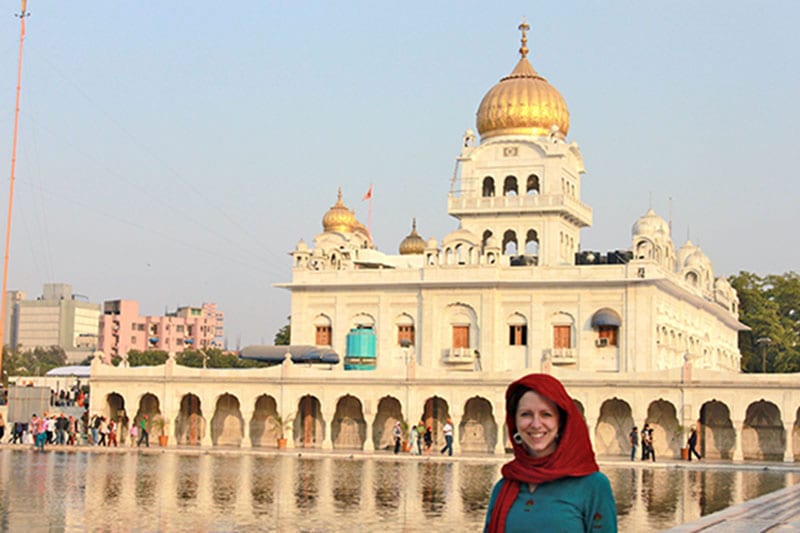Terri considers herself “very lucky”.
In the 80s her paternal grandmother and her grandmother’s two sisters were diagnosed with ovarian cancer. In the 90s, her family entered into the BRCA1 gene mutation study.
Terri learned she had a predisposition for breast and ovarian cancer when she was 19. Despite the objectively negative news, she felt lucky that she knew about the predisposition and lucky to have access to cancer screening. She began screening for breast and ovarian cancer at 23, every 6 months, with an MRI every year.
She was told she could have a proactive mastectomy, but at only 23, with the hopes of someday being a mother and being able to breastfeed her children, she chose to wait. She figured the consistent screenings would be enough.
Her scans kept coming back clear until the summer of 2009. Something seemed suspicious and she was scheduled for a biopsy. Terri felt a wave or relief hit her when the radiologist called and told her the cells were benign. Then the radiologist continued; she didn’t feel confident that they had gotten the right cells during the initial biopsy and wanted Terri to come in for a second, MRI guided, biopsy.
Five days later, Terri was told that she had breast cancer.
Even with the knowledge of the predisposition, Terri was blindsided. She thought she may get cancer at 40 or 50. Instead, she was diagnosed at 30, at the peak of her career as a headhunter in the tech industry. She was single and planning on marriage and children in her future. She had dreamt of that since her brother, 9.5 years younger, was born, as she watched her mother care for him.
Still, once again, she knew she was lucky. The grade 3 tumor was tucked against the chest wall. There were no obvious lumps. Without knowing she had the predisposition and therefore getting the annual MRIs, Terri doesn’t think she would have been diagnosed- that she would have survived.
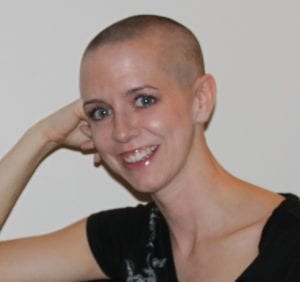 Terri underwent four rounds of chemo and a double mastectomy. Her treatments and reconstructive surgeries began in 2009 and continued through 2011. Not only were these physically and emotionally taxing in themselves, but Terri had to grapple with being removed from her career, which had been an integral part of her identity for years.
Terri underwent four rounds of chemo and a double mastectomy. Her treatments and reconstructive surgeries began in 2009 and continued through 2011. Not only were these physically and emotionally taxing in themselves, but Terri had to grapple with being removed from her career, which had been an integral part of her identity for years.
Terri felt lucky to have had the love and support that she did throughout treatment, but on New Years Eve in 2011 she felt alone. Everyone was celebrating and there seemed to be an expectation that she should be too. She was at the end of her procedures- her last surgery was three weeks away. Her hair was coming back in. The worst, in theory, was behind her.
She had started a blog to help her process her journey with cancer and keep her loved ones updated. It led her to rediscover her love of writing and was a useful tool for her personal growth.
She read Martha Beck’s advice about New Year’s resolutions, which involved coming up with how you want to feel in the coming year, rather than listing what you’d like to achieve, and typed a post in response to it. Terri thought she would like to feel healthy, loved, and inspired. She couldn’t picture ever feeling inspired again.
She found herself grappling with an onslaught of intense emotions. She had a great psychologist, whom she saw consistently and yet, she felt she was in a very dark place. She couldn’t see herself returning to her career that had been so important to her previously. It didn’t feel as though it mattered anymore.
Terri didn’t understand why she felt so lost, and she didn’t know how to get out of the isolating place that she was in. Support groups can be an incredible resource for people but she felt she needed something different at that point in her journey. She was done with treatment. Her hair was growing back and she felt like she was supposed to better – physically and emotionally. She hadn’t been aware of the way the emotional aftermath would weigh on her after cancer.
“How do I heal and rebuild and move forward? I didn’t know where to find that kind of support.”
She decided she had to do something to replace cancer as the most recent story in her life.
Then Terri met someone who was from Africa, and she thought to herself, “what if I go?”
“For the first time in a long time, I was excited. I had stopped looking forward. Maybe I was someone who could go to Africa.”- Terri
Terri decided that she would. She was eager to begin to move forward into her fresh chapter. She began to network – a skill of hers well-honed through her old job, and to research. She was on the phone with an organization she was researching the day before her final surgery.
Three months later she was boarding a flight.
“I needed to reclaim my life. Cancer doesn’t own me. It doesn’t win.”-Terri
Terri felt the trip was something she needed to do by herself. The people she would meet wouldn’t know her story. They wouldn’t know her as Terri the headhunter or Terri the patient. She hoped to find her new identity.
“I wanted to be around new people and try on a new sense of what I could become.”-Terri
This pivotal trip was to Cape Town. She found a reputable organization and unlike a more rural location, she knew she would have access to medical care should she need it.
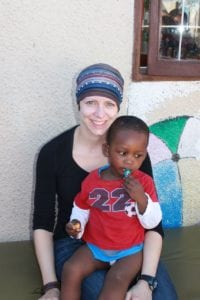 Terri was gone for a total of ten weeks – six of which were spent volunteering. She had fundraised, saved, and taken money out of her retirement account in order to make the trip happen. She had thought of her cousin, who after breast cancer at 28, had recently been diagnosed with Stage 3C ovarian cancer. It occurred to her that that could be her. She may not make it to retirement.
Terri was gone for a total of ten weeks – six of which were spent volunteering. She had fundraised, saved, and taken money out of her retirement account in order to make the trip happen. She had thought of her cousin, who after breast cancer at 28, had recently been diagnosed with Stage 3C ovarian cancer. It occurred to her that that could be her. She may not make it to retirement.
Terri met people who had lost family members to HIV, and who had lived through apartheid and felt the ubiquity of hardships and of tenacity sink in.
“We all have struggles and the capacity to be resilient.”-Terri
She traveled through Namibia and Botswana and then saw Victoria Falls –something she had dreamed about. She had time to reflect. She thought “A year ago I couldn’t get off the couch, and now I’m here. What else could I do?”
“I wanted to help other people heal and volunteer and have perspective shifting experiences.”-Terri
Terri returned in June 2011 and spent July weighing tough decisions. Her old job, that had been such an important part of her identity, was still available to her. She had been so dedicated to it that she never took more than a week off.
She considered it.
Then, she considered a trip around the world where she could scout out other countries and other organizations to help facilitate the kind of trip she had taken for other people. She typed this out on her blog. The words on her screen made the idea feel tangible. Maybe she should act on it now that she’d published it. She had spoken it aloud and now maybe she could speak it into existence.
Terri found a contest for an around the world flight. She won it.
“Serendipity.” She thought.
Terri gave notice on her apartment and sold most of her belongings. She once again tapped into her talent for networking and spoke with various groups in the cancer community within the US and Canada. She was looking to form a partnership with a preexisting cancer organization to build on her idea, but the reactions to her novel idea weren’t encouraging.
Terri wasn’t deterred. She believed too strongly in the way that her trip had healed her, had brought her out of the dark place that had seemed inescapable. She simply decided she would do it herself.
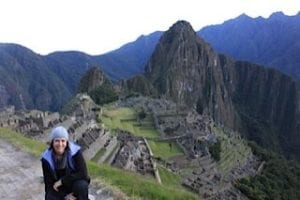 For six months she traveled around the globe. She volunteered, researched, and planned.
For six months she traveled around the globe. She volunteered, researched, and planned.
She returned to the US in June of 2012. She decided her pilot program would take place in February 2013 in India.
She found twelve cancer patients and survivors, six from Canada and six from the US, who were willing to join her on another continent. She didn’t have a team established yet, she would be there leading the group on her own.
She partnered with the organization Cross-Cultural Solutions to make sure that all of the logistics of the trip were taken care of and all of the travelers would be safe and cared for.
The most difficult part was the funding. Reflecting back, Terri feels she was naïve about how hard it would be. She had thought that she would be able to find sponsorship through social media campaigns but that route didn’t yield the results she had hoped for.
Terri still had a lot to figure out but she strongly believed in the vision she had. She was going to provide others with access to an experience where they couldn’t not be changed. She was going to provide a place where others who had been impacted by cancer could peel back a layer to see their baggage, and to allow their vulnerability to help them connect with others.
Her organization, A Fresh Chapter, now has developed multiple programs with both online and onsite components, with psycho-social healing activities and content meant to “help people think about adversity as a catalyst for growth”. The programs encourage resilience and allowing patients and caregivers to consider “what might be possible for me now?
AFC programs are open to any patients or caregivers who have been impacted by cancer. The commonality tends to be a mindset. The programs are attended by people of a wide variety of backgrounds and by people at varied points in a cancer journey: those who have just finished treatment, those who have been out of treatment for over a decade, and/ or those who are currently living with late stage cancer.
Terri remembers being in her psychologist’s office, expressing how alone she felt. Her friends were having children and growing their careers but she also no longer felt she directly related to other patients who were still in the throes of treatment. Her psychologist explained what she was experiencing could essentially be considered a midlife crisis-just at 30. While the therapist said that her peers would catch up in their experiences and perspectives eventually, that if Terri could do something that related to her current values and interests, she could connect with others who shared them.
This is the concept that allows attendees to connect so well with one another. There is a robust selection process in which potential participants are interviewed by program alumni and speak with Terri or a member of her team. They discuss what each person is looking for and whether or not AFC programs are the right fit for them
“Timing is important. Do you want to move forward and give back to others?”-Terri
Terri feels volunteering is perhaps the most important element of the programs.
“That’s the piece that gets people out of feeling victimized. That empowers them and gives them the perspective that struggle and resilience is universal.”-Terri
Those who are newly diagnosed may need more specific support groups or tumor specific support and may not be quite ready to think about long term. In these cases, AFC will refer patients to other organizations that may be more helpful for them.
For those who are not healthy enough to travel, or those uninterested in traveling, AFC is building an online only curriculum. AFC also provides programs within the US.
“I needed something big -a jolt- but everyone is different. We want to find the right recipe for each person. We want people to feel heard, seen, and valued. We create a broader sense of belonging.”-Terri
AFC has programs located in four countries including the US, with plans to expand to a fifth- a pilot program will be taking place in Kenya in the fall of 2019.
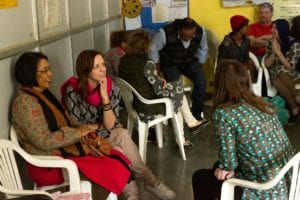 AFC’s programs are not only focused on the well-being and growth of its participants, but also the impact they are having on local communities. The programs are meant to be both mutually beneficial for travelers and locals. AFC ensures that its effects on local communities are what each community needs by working directly with local partners for deliberate and sustainable assistance that considers unique needs and cultural contexts.
AFC’s programs are not only focused on the well-being and growth of its participants, but also the impact they are having on local communities. The programs are meant to be both mutually beneficial for travelers and locals. AFC ensures that its effects on local communities are what each community needs by working directly with local partners for deliberate and sustainable assistance that considers unique needs and cultural contexts.
For this reason, AFC will continue to grow and develop while most likely not continuing to expand their locations.
“I want the people living there to have a meaningful experience, for there to be a sustainable, true partnership and to cultivate a relationship. With fewer countries we can have a deeper impact. “-Terri
AFC has plans for future programs for Alumni and more advocacy leadership programs. Program Alumni have a history of keeping in touch and staying involved – via meet ups, WhatsApp groups, and ambassadorship. Terri hopes to host an in-person forum in the future so they can reconnect face to face.
